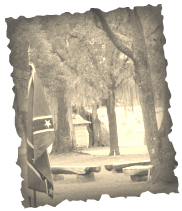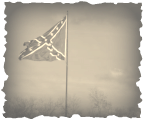I'd like to share a story written by a friend of mine over at Sons of the Remnant...
(Is it silly to call people you've never actually met 'friends'? I really don't think so.)
(Is it silly to call people you've never actually met 'friends'? I really don't think so.)
The Good Ship Western Christendom
Being an Allegory by Andrew Romanowitz
While going through my papers yesterday, I found a portion of a story which was
recorded by an old collector of tales of the sea, whose name, it seems, is now
lost to history. Lamentably, the narrative is incomplete; nonetheless, I have
decided to post it here, as I think the readers will find it an object of interest. The portion of the manuscript which I have in my possession reads thus:
~~~~~~~~~~~~~
On a distant ocean, long ago and far away, a fine ship of war named the Western
Christendom lay dead in the water. She had been long known as a ship of noble bearing and distinguished martial honor, yet when we approached her we found that most of hew crew lay sleeping in the sunlight as she listlessly drifted on the open sea..
Some reader well-versed in maritime history might ask by what stroke of ill fortune she found the doldrums. Ah, but you see, she wasn't in the doldrums. The
sailors had simply hoisted down the sails. It appears that every man on board
was certain that the martial voyage was doomed to failure. Rather than continue
a journey that they considered futile, they decided it would be most comfortable and therefore most advantageous to hoist down the sails and fall asleep on the deck. This turn of events is astonishing, as the Western Christendom was renowned for having seized victory from the jaws of defeat in many a fight on the high seas, and her crew was counted by some as the finest that had ever crossed the line. We are not certain as to how the persuasion of the entire crew was effected. While we have heard it reported that the captain himself commanded this course of action (or rather lack thereof), we do not wish to impeach the good name of the captain, and so we prefer to believe that the officers and sailors acted against orders. Someone has suggested that the helmsman and the first and second mates were largely responsible, and that they convinced most of the crew that such was a necessary consequence of the essential principles of military duty and good seamanship. Absurd as it may seem, we hope the reader will forgive us if we are inclined to lend more credibility to this account.
But whatever the case may have been, not long after the Western Christendom
began to drift, an enemy vessel hove into view and showed herself to be a forty-four-gun man of war. Without delay she commenced pouring successive broadsides over the decks and into the hull, tearing holes into the ship's side and flooding the lower compartments. Yes, my lads, such was the woeful state of the good ship Western Christendom on that distant ocean long ago and far away...
In the midst of the barrage, there were a few officers making rounds of the deck
and noting the damage to those of the sailors who seemed roused by the roar of
enemy gunfire, while reassuring them with the utmost calmness that the Western Christendom would sink very soon, and the enemy be unhindered ruler of the high seas. This news, it appears, had varied effects on the illustrious crew; Many of the more craven and youthful souls jumped overboard, fearing the guns of the enemy more than the shark-filled waters of the open sea. Others sought to return to their
sleep, convinced that the sooner the good ship went down, the better it would be for them, and that if they were sure to die, it were better to die peaceably. Nonetheless, they were certain that they were faithful sailors, and not mutineers in the least; and as faithful sailors, they said, they were resolved to die on board the ship with full military honor amid the thunder of battle. They wished to spend their final hours contemplating the peaceful clouds floating across the sky rather than manning the ship's guns. But below decks, there were yet a few men still defiantly firing at the enemy ship, ignoring drowsy and incoherent shouts of ridicule from the men reclining on deck.
~~~~~~~~~~~~
And here the manuscript breaks off, leaving us only to wonder about the conclusion of this seemingly fantastic, yet strangely familiar tale of the sea, and the fate of the good ship Western Christendom and her crew.
Thank-you for letting me post this, Andrew!










 RSS Feed
RSS Feed


